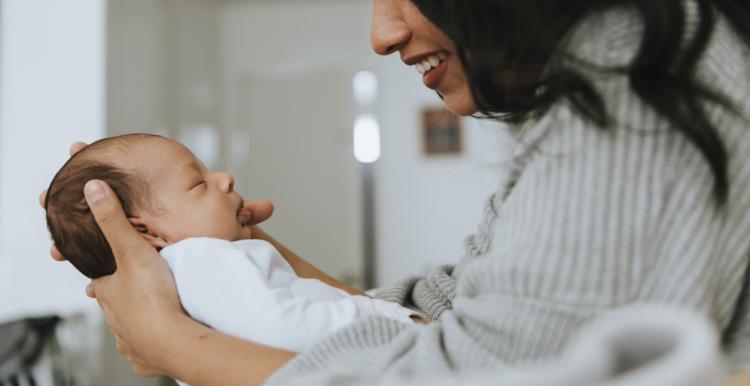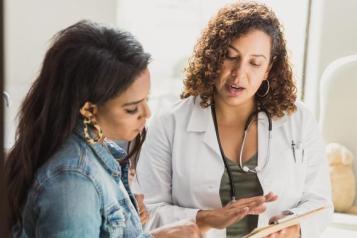Maternity support during COVID-19

How does coronavirus affect pregnancy?
According to the NHS, it's expected that most pregnant women will experience mild or moderate cold or flu-like symptoms.
Pregnant women have been placed in the 'vulnerable group' by the Chief Medical Officer. There is no evidence to suggest being pregnant means you're more likely to get coronavirus. However, for a small number of women, it does mean being pregnant may change the way their body handles severe viral infection.
If you're pregnant and have an underlying health condition, such as asthma or diabetes, you may be more unwell if you develop the virus. If you have significant heart disease, congenital or acquired, you are considered extremely vulnerable and should follow the government advice and guidance.
Has COVID-19 affected the care I should expect?
With NHS services changing the way they work in response to COVID-19, some people who are currently expecting children have told Healthwatch that they are concerned that about going into hospital during the current outbreak and that there is not enough support for them to give birth at home.
The NHS has written to services reminding them that they need to:
- Be in regular contact with all women receiving antenatal and postnatal care.
- Make clear to women how to access maternity services for scheduled and unscheduled care.
- Encourage them to raise any concerns so that the maternity teams can advise and reassure women of the best and safest place to receive care.
If you are worried you should contact the service who is supporting you to understand the support available and to discuss your concerns.
Tell us about your experience of care
Has your care been disrupted by COVID-19 and its impact on health and social care services? Whether it’s good or bad, we want to hear from you.
It only takes five minutes and your feedback can help NHS and social care services understand the steps they can take to improve care for you and your loved ones.
What is the government’s advice for pregnant women?
Pregnant women are considered to be a vulnerable group, so it’s important that you follow the government advice on coronavirus.
Follow the hygiene advice
There are general principles you can follow to help prevent the spread of respiratory viruses such as COVID-19, including:
- Washing your hands more often - with soap and water for at least 20 seconds or use a hand sanitiser when you get home or into work, when you blow your nose, sneeze or cough, eat or handle food.
- Avoid touching your eyes, nose, and mouth with unwashed hands.
- Avoid close contact with people who have symptoms.
- Cover your cough or sneeze with a tissue, then throw the tissue in a bin and wash your hands.
- Clean and disinfect frequently touched objects and surfaces in the home.
Maintain social distancing
Social distancing refers to limiting face-to-face contact with others as much as possible. You should read the government guidance but the steps you should be following as much as possible include:
- Avoid contact with someone who is displaying COVID-19 symptoms of coronavirus, such as a high temperature and/or new and continuous cough and/or a loss or change to their sense of smell or taste.
- Avoid non-essential use of public transport.
- Work from home, where possible. Your employer should support you to do this.
- Avoid large and small gatherings in public spaces or getting together with friends and family in person.
- Use telephone or online services to contact your GP or other essential services.
What should pregnant women do if they have coronavirus symptoms?
- If you are pregnant and you have either a high temperature and/or new persistent cough and/or a loss or change to your sense of taste or smell, you should stay at home for at least seven days. Do not go to your GP, pharmacist or hospital. Find out more about what to do if you need to self-isolate.
- You should let your midwife or maternity unit know if you have symptoms, especially if you have any routine appointments in the next seven days.
- If you have symptoms of coronavirus (COVID-19), you can ask for a test via the NHS website to check if you have the virus. You need to get the test done in the first 5 days of having symptoms.
- If your symptoms are mild, you will be advised to stay at home. If your symptoms are severe you may need to be treated in hospital.
- If you feel your symptoms worsening or if you are not getting better, you should contact your maternity care team, your GP or use NHS 111. In an emergency call 999.
Should pregnant women attend antenatal appointments?
- If you are well, it’s important that you still attend your antenatal appointment. If you are displaying symptoms of COVID-19, contact your community midwife to postpone your appointment until the self-isolation period is over.
- If you would like your partner to attend your appointment with you, check with your midwife that this is still possible. Some services have put restrictions in place to protect staff and other visitors.
- If you are due a routine scan or visit, check with your maternity unit for advice as you may still need to attend.
- If you are asked to attend a scan or an appointment, you should go.
Mental health advice for pregnant women
More than 1 in 10 women develop a mental health issue during pregnancy or after giving birth. Pandemics, like coronavirus, are likely to cause anxiety. If expectant and new parents are worried about their mental wellbeing, they can get support from range of different organisations and charities. The Maternal Mental Health Alliance has an updated list of organisations that parents can contact during coronavirus.
Got another question?
As well as the advice available from the NHS, Government and charities the Royal College of Obstetrics and Gynaecology has also produced a detailed COVID-19 Q&A for pregnant women and their families covering:
- General advice.
- Getting antenatal care.
- Child birth choices and birth partners.
- Having a COVID-19 infection or suspected infection.
- The period after birth.


